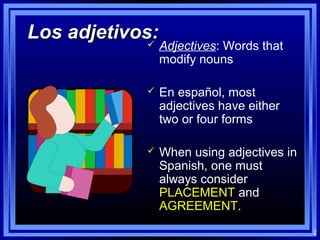Module 1 los adjetivos
- 1. Adjectives 1
- 2. Los adjetivos:  Adjectives: Words that modify nouns  En español, most adjectives have either two or four forms  When using adjectives in Spanish, one must always consider PLACEMENT and AGREEMENT. 2
- 3. ADJECTIVE AGREEMENT: An adjective may have up to four forms. The form used in a sentence must agree with the noun that it modifies. simp√°tco (m/s) simp√°tica (f/s) simp√°ticos (m/p) simp√°ticas (f/p) 3
- 4. ADJECTIVE AGREEMENT: If an adjective ends in DOR or DORA then it will usually have four forms and the form that you use in any given sentence must agree with the noun that it modifies. trabajador (m/s) trabajadora (f/s) trabajadores (m/p) trabajadoras(f/p) 4
- 5. ADJECTIVE AGREEMENT: If an adjective ends with “only two forms – singular and plural. inteligente (s) inteligentes (p) 5
- 6. PLACEMENT OF ADJECTIVES 1. Restrictive adjectives • placed in front of the noun 2. Descriptive adjectives • placed after the noun 3. Nouns used as adjectives • placed after the noun and separated by the word “de” 6
- 7. EXAMPLES: the big backpack la mochila grande a white book un libro blanco three Spanish notebooks tres cuadernos de español 7
- 8. PRACTICE: • some school backpacks • a big desk • five English books • two Spanish students • a disorganized notebook • four hard working boys 8
- 9. PRACTICA • unas mochilas de escuela • un pupitre grande • cinco libros de inglés • dos estudiantes de español • un cuaderno desordenado • cuatro chicos trabajadores 9
- 10. PRACTICA • unas mochilas de escuela • un pupitre grande • cinco libros de inglés • dos estudiantes de español • un cuaderno desordenado • cuatro chicos trabajadores 9









